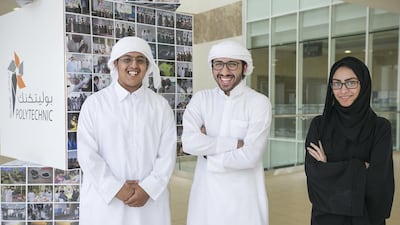Compared to the fanfare that the inaugural graduating class of New York University Abu Dhabi received, Abu Dhabi Polytechnic's first group of nuclear engineers to complete their studies seemed distinctly low key. This belies the important role to be played by the 17 new graduates – and that of the polytechnic itself.
For all the disparity of publicity, the two institutions have complementary roles within the UAE’s educational structure. Both opened in 2010, having been preceded by Paris-Sorbonne University Abu Dhabi a few years earlier. But where NYU Abu Dhabi has the high profile, a liberal arts curriculum and is in the midst of moving to a new campus on Saadiyat Island, Abu Dhabi Polytechnic’s main campus is sited in the less fashionable surrounds of Mohammed bin Zayed City and it has a firmly vocational educational programme modelled on Germany’s apprenticeship training scheme.
In this, the polytechnic fills an important category in the UAE. Any Emirati seeking a degree with which to launch a career in the public sector in a management role has a relative wealth of educational options from which to choose. But for some Emiratis, their skills and natural abilities are better suited to a more vocational career path and this is exactly the kind offered by the polytechnic. This breadth of skills also fits into the goals of Abu Dhabi Economic Vision 2030, part of which cites creating a class of technical experts suited to industrial roles.
The UAE’s nascent nuclear industry is a perfect match for this highly technocratic emphasis. With the reactors of the Emirates Nuclear Energy Corporation due to begin commercial operations in Abu Dhabi’s western region in 2017, a skilled workforce of Emiratis will be needed.
So too is aerospace engineering and manufacturing, another major focus for the polytechnic that is conducted at its Al Ain campus. Strata Manufacturing, a subsidiary of Mubadala Aerospace, manufactures plane parts for Boeing and Airbus. Just over one third of its workforce are Emiratis and 85 per cent of those are women. The company hopes to increase the number of Emiratis to become half of its workforce.
These are exactly the well-paid, high-skill jobs that were envisaged when the UAE decided to focus on creating a knowledge economy. Despite the lack of fanfare, Abu Dhabi Polytechnic is leading the way.

